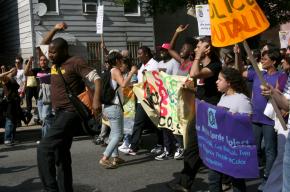The NYPD’s antigay violence
reports on the struggle of two lesbians who are speaking out after they were beaten by New York City police.
FORTY YEARS after the Stonewall Inn uprising in New York City--where gays and lesbians fought back against police harassment and sparked a new social movement--it's still common for the NYPD to target lesbian, gay, bisexual and transgender (LGBT) people, especially LGBT people of color.
Jeannette Grey and Tiffany Jimenez learned that fact firsthand on May 16. The two lesbians were at the IFE Lounge in Brooklyn when they heard shouting outside and ran to see if their friends were okay. Before they knew it, police were throwing them to the ground, beating them with nightsticks and hurling slurs at them.
This might have been just another all-too-frequent case of police brutality in the Crown Heights area of Brooklyn, except these two courageous women decided to tell their story and fight back.
Jeannette, a 31-year-old African American lesbian, who goes by J.G., explained what happened:
Not only were we beaten, but the cops hurled anti-gay statements as they raised their nightsticks. Then, they had the audacity in front of their own sergeant and the rest of their brothers and sisters to say, "We are having some dyke pussy in here tonight."
I knew then that this crime wasn't just about me or about the other female involved. As I laid there, and I felt the nightsticks hit me, I thought of Martin Luther King, and what he had to endure just for us to have the freedoms we do today.
I immediately relaxed my body, put my arms up where they could see I wasn't resisting, and screamed at the top of my lungs for someone to hit record on their camera. As they pulled me into the car, I knew that they picked the wrong quote-unquote "dyke" to mess with.

The other woman attacked by the police was 19-year-old Tiffany. As she described, while fighting back tears:
I'm very small, and I had no shoes, and they threw me on my back. I was wearing a dress, and they flipped me over, exposing my butt. I was screaming and crying--I was so scared.
I don't feel safe from the NYPD. We're supposed to be able to call on them when hate crimes happen, but they're the ones who are committing hate crimes against us. I don't know who we're supposed to call for help any more. I don't want to call the cops.
ON JUNE 6, J.G. and Tiffany spoke out at a press conference outside the 77th Precinct in Crown Heights, with the support of the organizations Safe OUTside the System (SOS, a part of the Audre Lorde Project) and Gays and Lesbians of Bushwick Empowered (GLOBE, a program of Make the Road NY).
Community organizers also spoke and encouraged people to get involved in fighting police brutality. "We learn to avoid the cops because we are harassed just for being who we are: black, Latino, immigrant, LGBTQ teenagers or for simply being in the wrong place at the wrong time," said one GLOBE member.
Andrea Ritchie, a civil rights attorney who was a research consultant and co-author for Amnesty International's 2005 report "Stonewalled: Police Abuse and Misconduct Against LGBT People in the U.S.," stated: "As individuals, we can make civil complaints, but as a community, we need to demand real accountability."
Councilwoman Letitia James connected the brutality faced by J.G. And Tiffany with the recent murder of 25-year-old Omar Edwards, a Black off-duty police officer shot by a white cop who mistook him for a robber. James called on the King's County prosecutor to drop charges filed against Tiffany for disorderly conduct and obstructing government administration.
The press conference concluded with a representative of SOS presenting a list of demands that included: a public apology to J.G. and Tiffany, and to the LBGT community; the firing of the officers involved; dropping all charges against Tiffany; an investigation of the incident and assault charges against the officers who attacked the two women; an independent prosecutor appointed for cases of police brutality; giving real authority to the Civilian Complaint Review Board; and legislative efforts to reduce police brutality.
At the end of the press conference, several hundred people marched proudly through the streets of Crown Heights, expressing high spirits and confidence with their chants, and meeting virtually no hostility from passersby.
The march ended on a particularly energizing note, with the reading of a powerful poem, full of beauty and rage, written in dedication to the bruises of the women who were beaten. Many joined in chanting lines from the poem like, "I want to hold my woman's hand in the street at midnight!"
This event was an example of the strong message that can be sent when people have the confidence to fight and combine the struggles against homophobia, racism and police brutality.


